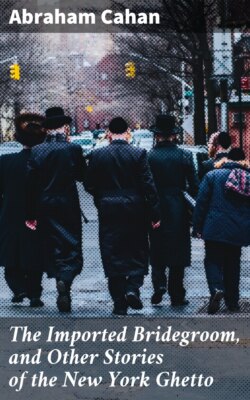Читать книгу The Imported Bridegroom, and Other Stories of the New York Ghetto - Abraham Cahan - Страница 5
На сайте Литреса книга снята с продажи.
II
ОглавлениеTable of Contents
When Asriel Stroon had retired from business, he suddenly grew fearful of death. Previously he had had no time for that. What with his flour store, two bakeries, and some real estate, he had been too busy to live, much less to think of death. He had never been seen at the synagogue on week-days; and on the Sabbath, when, enveloped in his praying-shawl, he occupied a seat at the East Wall, he would pass the time drowsing serenely and nodding unconscious approval of the cantor's florid improvisations, or struggling to keep flour out of his mind, where it clung as pertinaciously as it did to his long Sabbath coat.
The first sermon that failed to lull him to sleep was delivered by a newly landed preacher, just after Asriel had found it more profitable to convert his entire property into real estate. The newcomer dwelt, among other things, upon the fate of the wicked after death and upon their forfeited share in the World to Come. As Asriel listened to the fiery exhortation it suddenly burst upon him that he was very old and very wicked. "I am as full of sins as a watermelon is of seeds," he said to himself, on coming out of the synagogue. "You may receive notice to move at any time, Asriel. And where is your baggage? Got anything to take along to the other world, as the preacher said, hey?"
Alas! he had been so taken up with earthly title deeds that he had given but little thought to such deeds as would entitle him to a "share in the World to Come;" and while his valuable papers lay secure between the fireproof walls of his iron safe, his soul was left utterly exposed to the flames of Sheol.
Then it was that he grew a pair of bushy sidelocks, ceased trimming his twin goatees, and, with his heart divided between yearning after the business he had sold and worrying over his sins, spent a considerable part of his unlimited leisure reading psalms.
What a delight it was to wind off chapter after chapter! And how smoothly it now came off, in his father's (peace upon him!) sing-song, of which he had not even thought for more than thirty years, but which suddenly came pouring out of his throat, together with the first verse he chanted! Not that Asriel Stroon could have told you the meaning of what he was so zestfully intoning, for in his boyhood he had scarcely gone through the Pentateuch when he was set to work by his father's side, at flax heckling. But then the very sounds of the words and the hereditary intonation, added to the consciousness that it was psalms he was reciting, "made every line melt like sugar in his mouth," as he once described it to the devout housekeeper.
He grew more pious and exalted every day, and by degrees fell prey to a feeling to which he had been a stranger for more than three decades.
Asriel Stroon grew homesick.
It was thirty-five years since he had left his birthplace; thirty years or more since, in the whirl of his American successes, he had lost all interest in it. Yet now, in the fifty-eighth year of his life, he suddenly began to yearn and pine for it.
Was it the fervor of his religious awakening which resoldered the long-broken link? At all events, numerous as were the examples of piety within the range of his American acquaintance, his notion of genuine Judaism was somehow inseparably associated with Pravly. During all the years of his life in New York he had retained a vague but deep-rooted feeling that American piety was as tasteless an article as American cucumbers and American fish—the only things in which his ecstasy over the adopted country admitted its hopeless inferiority to his native town.
